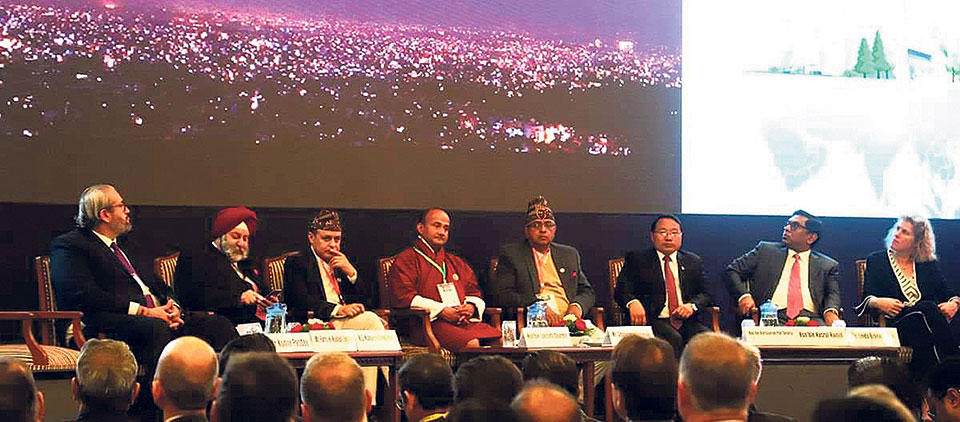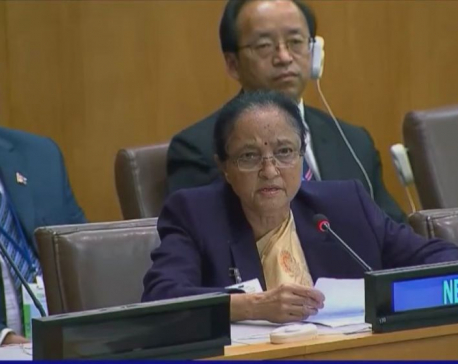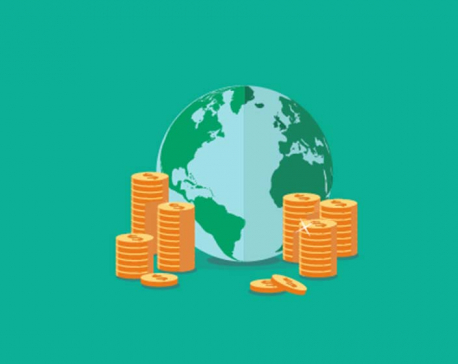
OR
Energy sector experts call for ensuring mutual economic benefits through multilateral power trade
Published On: November 23, 2019 12:17 PM NPT By: Republica | @RepublicaNepal

KATHMANDU, Nov 23: Despite having huge potential in production and trading of energy in the South Asian countries including Nepal, these countries have failed to receive larger benefit as they rely only on trading surplus energy than the ones based on economic value addition, said analysts speaking at the Power Summit 2019 on Thursday.
As of now, most of the countries in the region have been engaged in bilateral energy trading based on surplus production. However, there is a growing concern only in the past few years to carry out the energy trade based on comparative advantage and in multilateral modality, said the sector’s experts.
Nepal has a large amount of economically feasible electricity that has high export potential. With having inadequate production, the country however has been importing electricity from India since 2008.
Only since last year, Nepal has started exporting its surplus electricity to India citing to utilize an increasing hydropower production in the country. Currently, Nepal exports electricity to India during rainy season and off-peak hour of electricity consumption when the country produces electricity in excess to the demand.
Speaking at the summit, Rajesh Kumar Mediratta, director of Indian Energy Exchange, said it was now time for Nepal to consider electricity trading to ensure economic benefit than just offloading the excess amount of production.
“In context of an increasing demand in Nepal and other South Asian countries, there is a need for creating power pool to cater to the scope of mass consumption,” said Mediratta giving an example of over 4,000 industrial consumers existing in India.
The World Bank in its report published in 2014 also mentioned that trade in electricity can help bring down energy prices in the entire region, mitigate against power shocks, relieve shortages, facilitate decarbonization, and provide incentives for market extension and integration.
“Regions with low cost generation resources could become net exporters of power, while electricity customers in high cost areas could benefit from cheaper imports,” reads the report.
Targeting to utilize its hydropower potential, Nepal is now looking forward to export its electricity to the third countries apart from India. In an initiative, signing a tripartite agreement with India and Bangladesh for electricity trading is in progress.
The participants sought need for harmonization in government policies and development of institutional frameworks to benefit the countries from multilateral power trading.
“Although the concerned countries have initiated to upgrade the cross border transmission lines, absence of policy frameworks and multilateral agency will still remain the bottleneck,” said Maha Prasad Adhikari, chief executive officer of Investment Board Nepal.
So far, India has revised the electricity regulation based on ‘Guidelines on Cross-Border Trade of Electricity’ making it compatible for energy trading with Nepal, Bangladesh, Bhutan and Myanmar. With the new rule in place, the Indian government has made it possible for Nepali power developers to utilize India’s transmission network to export energy to third countries.
But Nepal is yet to enact legislation allowing the independent power producers to engage in cross-border energy trade. Kulman Ghising, managing director of the Nepal Electricity Authority, said the government was after devising a policy to ensure short term and long term market to benefit the country out of the expanding electricity production.
The summit concluded on Friday.
You May Like This

South Asia most vulnerable to climate change impacts: Minister Regmi
EGYPT, Nov 10: Minister for Women, Children and Senior Citizens, Uma Regmi, has said that the fragile topography and high... Read More...

Impact of political and economic crisis in Europe on emerging South Asian countries
South Asian countries are suffering the consequences of a tense and unstable global economic situation, with multiple causes, including the... Read More...

Over 4 million children are estimated to be impacted by monsoon-induced disasters in South Asian countries including Nepal: UNICEF
KATHMANDU, July 25: Over 4 million children are currently estimated to be impacted by monsoon-induced disasters and in urgent need of life-saving... Read More...




_20220508065243.jpg)
Just In
- MoHP cautions docs working in govt hospitals not to work in private ones
- Over 400,000 tourists visited Mustang by road last year
- 19 hydropower projects to be showcased at investment summit
- Global oil and gold prices surge as Israel retaliates against Iran
- Sajha Yatayat cancels CEO appointment process for lack of candidates
- Govt padlocks Nepal Scouts’ property illegally occupied by NC lawmaker Deepak Khadka
- FWEAN meets with President Paudel to solicit support for women entrepreneurship
- Koshi provincial assembly passes resolution motion calling for special session by majority votes













Leave A Comment